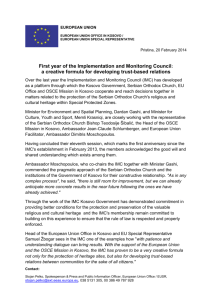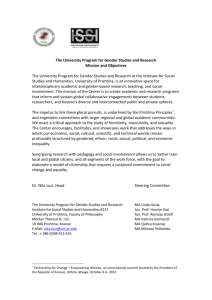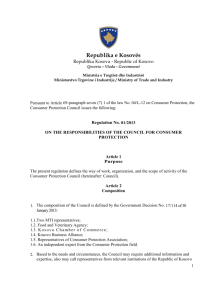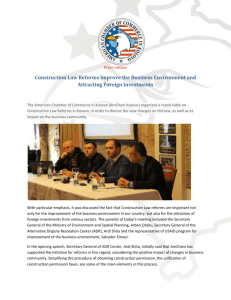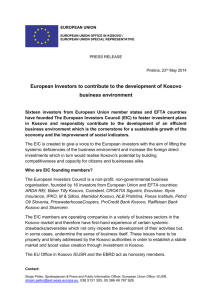Forum: - timun
advertisement
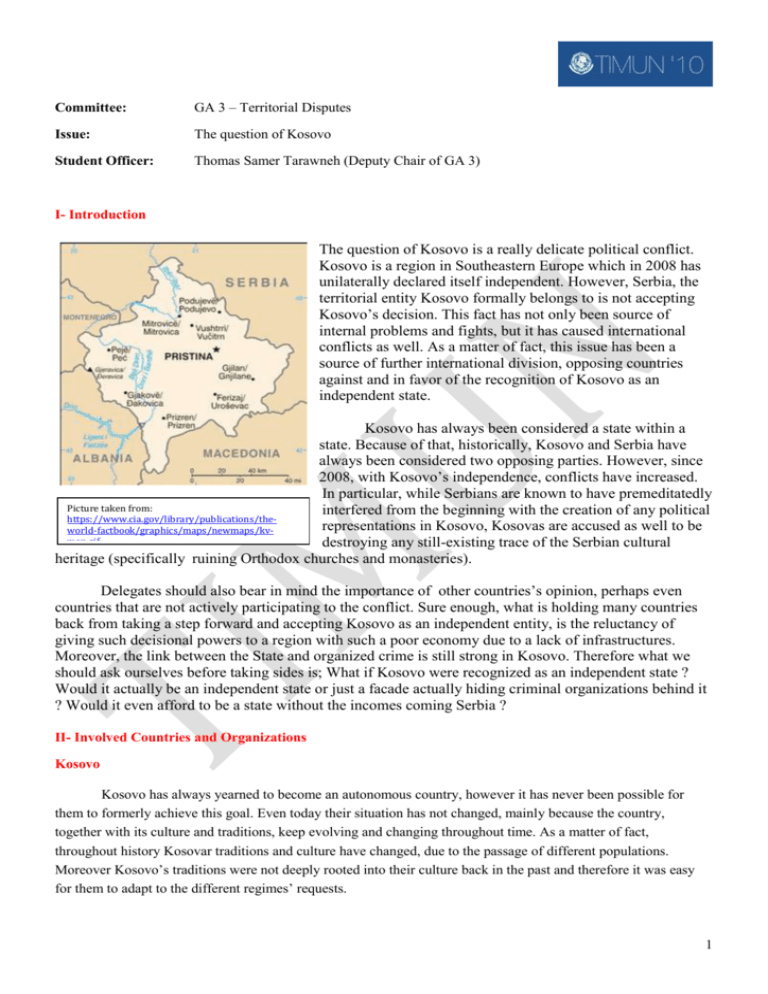
Committee: GA 3 – Territorial Disputes Issue: The question of Kosovo Student Officer: Thomas Samer Tarawneh (Deputy Chair of GA 3) I- Introduction The question of Kosovo is a really delicate political conflict. Kosovo is a region in Southeastern Europe which in 2008 has unilaterally declared itself independent. However, Serbia, the territorial entity Kosovo formally belongs to is not accepting Kosovo’s decision. This fact has not only been source of internal problems and fights, but it has caused international conflicts as well. As a matter of fact, this issue has been a source of further international division, opposing countries against and in favor of the recognition of Kosovo as an independent state. Kosovo has always been considered a state within a state. Because of that, historically, Kosovo and Serbia have always been considered two opposing parties. However, since 2008, with Kosovo’s independence, conflicts have increased. In particular, while Serbians are known to have premeditatedly Picture taken from: interfered from the beginning with the creation of any political https://www.cia.gov/library/publications/therepresentations in Kosovo, Kosovas are accused as well to be world-factbook/graphics/maps/newmaps/kvmap.gif destroying any still-existing trace of the Serbian cultural heritage (specifically ruining Orthodox churches and monasteries). Delegates should also bear in mind the importance of other countries’s opinion, perhaps even countries that are not actively participating to the conflict. Sure enough, what is holding many countries back from taking a step forward and accepting Kosovo as an independent entity, is the reluctancy of giving such decisional powers to a region with such a poor economy due to a lack of infrastructures. Moreover, the link between the State and organized crime is still strong in Kosovo. Therefore what we should ask ourselves before taking sides is; What if Kosovo were recognized as an independent state ? Would it actually be an independent state or just a facade actually hiding criminal organizations behind it ? Would it even afford to be a state without the incomes coming Serbia ? II- Involved Countries and Organizations Kosovo Kosovo has always yearned to become an autonomous country, however it has never been possible for them to formerly achieve this goal. Even today their situation has not changed, mainly because the country, together with its culture and traditions, keep evolving and changing throughout time. As a matter of fact, throughout history Kosovar traditions and culture have changed, due to the passage of different populations. Moreover Kosovo’s traditions were not deeply rooted into their culture back in the past and therefore it was easy for them to adapt to the different regimes’ requests. 1 Kosovo’s community mainly consists of Albanians, who alone constitute almost 90 % of the population. Often an annexation of Kosovo to Albania has been suggested. However what basically needs to be considered is that aside from the Albanian language there is nothing in common between Albanian and Kosovars. If the Kosovars do not feel like they belong being part of Serbia, they would not feel well being in Albania, either. Reaching autonomy, or at least ultimately finding a solution to this issue is of the utmost importance to most of the countries supporting Kosovo, so as to improve stability in the Eastern Europe region. Therefore a mutually agreeable treaty is what the international community is looking for. The common belief of Kosovo is that the still existing link between them and Serbia is standing in their way to self-reconstruction and prosperity. According to Kosovo’s government, the country is full of potential not only for its natural resources but also for its people. Therefore, independence, followed by its membership into international bodies such as the UN and the EU would represent the fastest way to develop their economy, which otherwise would be completely hindered. Serbia Ever since Kosovo has shown signs of its will to gain independence, Serbia has demonstrated not to be open to this, considering Kosovo’s request unconstitutional. In fact it has submitted the matter to the International Court of Justice (ICJ), which, however, responded in favor of Kosovo. As opposition to Kosovo’s desire for independence, Serbia has threatened a trade embargo cutting off its economic and energy supplies as well as primary products to Kosovo. Besides that, the Serbian parliament has approved a resolution which officially considers Kosovo's request as unconstitutional and unrecognizable. Serbia is supported mainly by Russia and other countries which have their own issues with minority societies. Kosovo is the birthplace of their religion and is considered very important to their culture since the Middle Ages, thus Serbia is reluctant to give them its independence. It is Serbia’s aspiration to be a part of the European Union. However having this issue with Kosovo could certainly delay its entrance. Serbia is willing to give high autonomy to Kosovo in spite of not wanting them to be a country. Many believe that the Serbians are not interested in the people of Kosovo but only in its territory. Moreover, there are other factors that worry Serbia. Although Kosovo has for centuries represented a minority within the the Balkan community, in case Kosovo gained independence it is feared that the Serbian minority within the Kosovar state might be discriminated against. P-5 Countries 91 UN countries have recognized Kosovo as an independent state so far. While many countries are already sure of what side taking, many are uncertain and think that this decision should be taken by the United Nations Security Council. However, in case a decision should be taken by this organ, not all the countries having veto power would be in favor of Kosovo being independent. 2 As a matter of fact, two major countries, the Russian Federation and the People’s Republic of China, have more than once threatened to use their veto power in case they had to. The reasons why they are so concerned Kosovo could get its independence are various. First of all they both believe that such a move could turn out to be damaging to the Balkans area, which is already a very sensitive one. Secondly, it could create a precedent that separatist groups could potentially seize on, which may be a dangerous threat to these two countries. Russia and China have already experienced regions wanting secession from the country , therefore if this precedent were set it might reignite these flames even worse than before In response to Kosovo’s wish to become independent immediately, it has been said both by representatives of China and Russia to establish talks between Kosovo and Serbia, so as to find a mutually acceptable solution. Though this would be the most beneficial and desirable solution, it has come to question whether this could still be possible. Neighboring Countries At the moment the opinions on Kosovo’s independence to its neighboring countries are very different. Except for Serbia, who for clear reasons is not accepting it, other countries having issues with secessionist groups in their own countries such as Romania and Greece are not recognizing Kosovo, either. Moreover, Bosnia and Herzegovina is not accepting Kosovo’s sovereignty as the Serb member of Bosnia’s Presidency is not allowing it. Nonetheless, some neighboring countries like Albania, Montenegro and Macedonia. Macedonia, however, is refusing to entertain business and/or political relationship with Kosovo until this delicate matter is officially resolved. On the other hand, Albania was one of the first countries to recognize Kosovo and to exchange embassies. Albania is currently in good relations with Kosovo. It has been said more than once by Albanian representatives that collaborating with Kosovo is the key to prosperity in the Balkan region. UNITED NATIONS The United Nations Organization has had a huge role in the mediation between Serbia and Kosovo. In the last years it has done whatsoever to create a collaborative environment between the two countries. Especially, considering the gravity of the conflicts between the two it has since 1999 established a protectorate in Kosovo in order to better control the area and to avoid collisions to increase. United Nations conferences have been place of confrontation between the parties in favor and against Kosovo independence. Although none of the countries is actually willing to change their mind and position, the UN is now trying to cool down conflicts in order not to make them evolve in armed conflicts that could lead to catastrophic consequences. The reason the UN is so involved in this issue is not only due to its importance in mediation as an international body. Aside from that, it has now become clear that because of the high number of countries involved and willing to take sides it is of the utmost importance to find a quick and mutually acceptable solution to both parties. UNMIK In 1999, after the NATO bombing in Serbia, the United Nations Interim Administration in Kosovo (UNMIK) was created after the Security Council’s own decision in Resolution 1244. The purpose in the 3 creation of such organization was to install an independent presence in Kosovo under the supervision of the United Nations. Since its establishment in Kosovo, the UNMIK has worked under four fundamental pillars aiming to the reconstruction and development of the country on humanitarian, economical and the democratic aspects. As a matter of fact, under the UNMIK supervision, which has been working in collaboration with other European agencies such as the OSCE and the European Union, Kosovo has been able to partially raise again. UNMIK has had a leading role in the years 1999-2008 in organizing and participating in the negotiations between Kosovo and Serbia, though none of them eventually reached a successful conclusion. The impossibility to get to an agreement acceptable to both sides has resulted in Kosovo’s unilateral secession from Serbia. After Kosovo has declared its independence, UNMIK tasks have essentially changed. Many legislative roles which used to be covered by the UNMIK, are now covered by other agencies such as EULEX, leaving UNMIK other responsibilities such as promoting security and democracy. III- Focused Overview of the Issue 1) Roots and Details of the Problem Kosovo is a territorial region of Eastern Europe. After centuries of submission and maltreatment, during which Kosovo has never had a leading role within its society, in 2008 it has eventually decided to proclaim itself independent from the country it still formerly is a region of, Serbia. The roots of this very issue lie in years and years of its history. Indeed, since the middle ages Kosovo has never had the chance to be an autonomous country, always being conquered and ruled by greater powers. Even in the 20th and 21st century, despite being governed by a neighboring country with which Kosovo shared similar traditions, it has experienced atrocities and massacres. Even declaring itself independent, Kosovo has not been completely freed from other countries’ control yet. In fact, Independence is not just about choosing to be independent, but is also about being recognized as so. In this sense the international community is now playing a very important and delicate role in deciding Kosovo’s future. As far as diplomacy is concerned, the question of Kosovo is not simply a matter of a country finally gaining its independence. As a matter of fact, not only is Serbia opposing to this process, but some other countries are not in favor of the independence of Kosovo as well. As seen from some countries’ perspective, the separation of Kosovo from Serbia could ultimately represent a precedent that could lead to other diplomatic conflicts. With the creation of Yugoslavia, the Serbian power, which itself was controlled by the USSR, ruled many different Balkan countries. However, with the collapse of the USSR, riots in Yugoslavia intensified until Bosnia, Croatia, Macedonia and Montenegro separated from Yugoslavia. Moreover, the levels of violence towards the Kosovars became overwhelmingly higher than in the past. The situation in Kosovo has radically changed since 1999, when abuses and injustices perpetrated by Serbs towards Kosovars were stopped by a systemic action of the NATO. Since then Kosovo has been under a protectorate of the United Nations. 4 During the last few years great efforts have been made by the United Nations together with the international community in order to find an acceptable solution to both parties to this problem. Nevertheless, no solution has actually been found suitable for either countries, as neither of them is going to give up on their expectations and what links them to the territory of Kosovo is highly rooted in both cultures. In consideration of the importance of finding a solution to this issue we need to keep in mind the general background of Kosovo. Kosovo is in a very delicate position being surrounded by some of the most influential countries of Eastern Europe. Whatever settlement or resolution should be agreed on could be able to enhance but also hinder the normal balance of the area, which is a risk many countries in Eastern Europe are not open to. Furthermore, what holds some countries back from recognizing Kosovo as a nation is the doubt on how feasible such a choice would be. We know for sure that not only is Kosovo in a delicate area where conflicts are easily brought up (therefore the possible reactions of Kosovo’s neighboring countries in case it got independence are unpredictable), but we most surely know that even in a case of independence of Kosovo many countries are not totally certain that Kosovo would be able to successfully govern itself. Corruption and crime rates are just some of the problems Kosovo would have to face alone if it were independent. Besides, most incomes and supplies Kosovo gets are from Serbia so many would be opposed to making Kosovo an independent a country when it cannot even afford to maintain itself. 2) Historical Background Kosovo has always been considered a sacred land by Serbians. Its religious importance is mainly due to the battles and conflicts against the ottomans that took place in Kosovo between the 14th and 15th centuries. After that period of time Kosovo has been under the Ottoman Empire’s control, until shortly before the beginning of World War, as a consequence of the decline of the Empire, the two lands, Kosovo and Serbia, were re-united. Many things, however, had changed. Although conflicts had always been present between the two parties, now they were deeper and stronger than ever. In 1919 after the Treaty of Versailles, Kosovo and Macedonia were formerly annexed to the Kingdom of Serbs, Croats and Slovenes (after 1929 known as Yugoslavia). After that years of massacre and conflicts followed, until in the early 70s Josip Broz Tito became first prime minister and then president of Yugoslavia. Until his death, Tito’s system guaranteed money, education and great autonomy to the Kosovo province. However, when Tito died, the situation collapsed again and Kosovars kept being prosecuted and almost ostracized from industries and work places. Then between 1998 and 1999 the conflicts exploded with the so-called War of Kosovo, fought by the Kosovo Liberation Army (KLA) and the Yugoslav forces. In 1999 the North Atlantic Treaty Organization, NATO, (without the support of the UN) decided to take action bombing Yugoslavia to force it into freeing Kosovo from its army. After 1999 Kosovo has been under a protectorate of the United Nations, until it has declared itself independent from Serbia in 2008. Kosovo has so far been recognized as independent by 91 member states. 5 3) Kosovo’s Economy Despite its wish of freedom, Kosovo, at least as far as its economical system is concerned, is far from independent. Kosovo has a weak economy mainly based on subsistence agriculture, small and middlesized companies and criminality. Moreover Kosovo, despite the early independence, has proven itself not be capable of being independent, mainly relying on external funding, not to mention remittances coming from Kosovar families living abroad ( in particular the United States and Germany). Kosovo is an overpopulated country. As a result of the overpopulation the Kosovar landholdings are becoming smaller and smaller, which leads to the birth of too many small farms and agricultural companies not able to compete with the much greater and more powerful western market. This process involving the agricultural sector is not only limited to it. As a matter of fact it is spread-out in many sectors of the Kosovar economy. As a result of this, there is no balance between the imported and exported goods in Kosovo, and while Kosovo has declared itself independent from Serbia, it is surely not independent from Serbia’s products. Another delicate issue concerning Kosovo is the question of education. Most of the population is undereducated and illiteracy is a problem still involving a great percentage of the Kosovars. However, there is a small percentage of people who have been raised during the United Nations’ protectorate who have received a good education. Nonetheless, most of those people can’t be relied on. Being educated, their expectations, especially concerning money, are off above the average. Therefore, they either are the first to move out of Kosovo or decide to work for criminal organizations willing to pay them. As well as a poor economical basis and a lowly educated population, Kosovo presents an extreme lack of infrastructures. In particular, the absence of road links connecting entire parts of the country represents a great obstacle standing in the way of the strengthening of the country’s structure. However, the possibility to avail of European, international and external private funding could really help solve this problem. Even so, questions regarding the effectiveness of international funding are repeatedly asked. While many would say it could positively influence the country’s economy, others would object saying that an excessive presence of international investors would just make Kosovo be greatly exploited therefore becoming another victim of the western system. IV- Key Vocabulary Embargo: action of temporarily stopping something, especially of trade or information Protectorate: a country which is generally controlled and defended by a more powerful country V- Important Events & Chronology Date (Day/Month/Year) Event 6 1919-1920 1999 17 February 2008 Creation of “The Kingdom of Slovenes, Croats and Serbs” (Yugoslavia) Establishment of UN protectorate Declaration of independence by Kosovo VI- Past Resolutions and Treaties RESOLUTION 1203 : http://www.un.org/peace/kosovo/98sc1203.htm RESOLUTION 1199: http://www.un.org/peace/kosovo/98sc1199.htm RESOLUTION 855: http://www.un.org/peace/kosovo/93sc855.htm Also write about agreements and treaties (e.g. Ottawa Treaty, the NPT) and briefly describe their role in the conflict. After you write about the resolutions and treaties, briefly analyze them. 1)Were they sufficient? 2) Why did they succeed, why did they fail to take action? 3)Who ratified the treaty? VII- Failed Solution Attempts Since the installment of the UN protectorate in Kosovo (1999) to Kosovo’s declaration of independence, the international community has tried hard to find a mutually agreeable settlement to Kosovo and Serbia. Particularly tenacious have been the efforts made between 2006 and 2007. In 2006 former Finnish president Martti Ahtisaari was sent to Kosovo as a special mediator to negotiate an agreement between Serbia and Kosovo. In 2007 the Comprehensive Settlement Proposal for Kosovo’s internationally supervised independence (also known as Ahtisaari Plan) was submitted. The proposal allowed Kosovo to become independent provided that it went through a period of international monitoring. It also set some really important principles concerning human rights and ethnical equality. Though the proposition gave a range of autonomy to the Kosovo Serb community in its own affairs and administration, Serbia strongly rejected it . Following Martti Ahtisaari intervention, the UN Secretary General Ban Ki-moon strongly suggested that a Troika were created. This Troika would be composed of a Russian, an America and a European representative. Despite these further negotiations none was eventually useful to conciliate the two parties. VIII- Possible Solutions What the international community has been wishing to get is a peaceful and mutually acceptable solution, so as to neither damage the two parties nor other countries in similar situations. The situation as it is now needs to be dealt with immediately. Now, even if the question resolved in complete favor of either of the two parties, it wouldn’t be a stable and permanent solution. It is in fact of the utmost importance that the two parties reach a solution together in order to actually stop the contrasts. The situation that has been going on for the last decades is completely unbearable for both Kosovo and Serbia. However, should a conclusion be reached, it cannot possibly happen unless a joint action of the 7 international community is taken. As a matter of fact this situation cannot be taken as a private matter, especially if the future of Kosovo is decided by the Security Council. Kosovo is seeking for help as well as the possibility to participate in international agencies and organizations such as the EU and the UN. This won’t be possible unless it is recognized as a country, though. Nonetheless, as much as Kosovo wants to become independent, Serbia won’t give up. Therefore, to make them reach an agreement, it is very important that they both make clear what they want and that they are aware they won’t find a solution unless they are ready to compromise. What the UN role could be in this situation is to organize talks in neutral places with the direct mediation of P5 nations representatives. What might be taken into consideration is for Kosovo to get a semi-independent status where it will have the right to have its own government, which will composed of both Kosovo-Albanian and Kosovo-Serb representatives. Furthermore, as far as Kosovo participation in international organs is concerned, Kosovo might get the right to take part and get the floor during assemblies, though, at least for now, without having the right to vote. IX- Useful Links UNMIK Background - United Nations Interim Administration Mission in Kosovo: http://www.un.org/en/peacekeeping/missions/unmik/background.shtml Making Peace: Kosovo (a) and Serbia http://www.metafuture.org/articlesbycolleagues/IvanaMilojevic/peaceserbiakosovo.htm CIA, The world factbook-Kosovo: https://www.cia.gov/library/publications/the-world-factbook/geos/kv.html UN Security Council Resolutions (UNSCR) Related to Kosovo: http://www.state.gov/p/eur/ci/kv/c24702.htm X- Works Cited "UNMIK Background." UN.org. United Nations, n.d. Web. 30 Sept. 2012. <http://www.un.org/en/peacekeeping/missions/unmik/background.shtml>. "Justice Failed in Kosovo." Amnesty.org. Amnesty International, n.d. Web. 30 Sept. 2012. <http://www.amnesty.org/en/news-and-updates/report/justice-failed-kosovo-20080130>. "Kosovo: The Country’s Unique Path to Independence and Its Status in International Law." Yulr.org. Yale University, n.d. Web. 30 Sept. 2012. <http://yulr.org/kosovo-the-country%E2%80%99s-unique-path-to-independence-and-its-statusin-international-law/>. "Making Peace: Kosovo (a) and Serbia." MetaFuture.org. N.p., n.d. Web. 30 Sept. 2012. <http://www.metafuture.org/articlesbycolleagues/IvanaMilojevic/peaceserbiakosovo.htm>. Capusella, Andrea. "Eulex in Kosovo: a shining symbol of incompetence." TheGuardian.co.uk. N.p., n.d. Web. 30 Sept. 2012. <http://www.guardian.co.uk/commentisfree/2011/apr/09/eulex-kosovo-eu-mission>. Bogdanovic, Dimitrije. "Knjiga o Kosovu" ["The Kosovo Question - Past And Present"]. 8 Kosovo.net. N.p., n.d. Web. 30 Sept. 2012. <http://www.kosovo.net/sk/rastko-kosovo/istorija/knjiga_o_kosovu/bogdanovickosovo_question.html> "China expresses concern over Kosovo." ChinaDaily.com. China Daily, n.d. Web. 30 Sept. 2012. <http://www.chinadaily.com.cn/china/2008-02/19/content_6464411.htm>. "Why Russia Is Against Kosovo Plan." CSMonitor.com. N.p., n.d. Web. 30 Sept. 2012. <http://www.csmonitor.com/2007/0628/p06s02-woeu.html>. "Country Report-Kosovo." IBDE.org. N.p., n.d. Web. 30 Sept. 2012. <http://ibde.org/component/content/article/163-country-report-kosovo.html>. "Summary of the Comprehensive Proposal for the Kosovo Status Settlement." State.gov. N.p., n.d. Web. 30 Sept. 2012. <http://www.state.gov/p/eur/rls/fs/101244.htm>. "Kosovo Status: Troika to host first face-to-face talks between Belgrade and Pristina delegations." EU-UN.europa.eu. N.p., n.d. Web. 30 Sept. 2012. <http://www.eu-un.europa.eu/articles/en/article_7337_en.htm>. "Presidency 'won't discuss Kosovo.'" B92.net. B92 News, n.d. Web. 30 Sept. 2012. <http://www.b92.net/eng/news/regionarticle.php?yyyy=2009&mm=08&dd=13&nav_id=61133>. "The Big Question: Why are so many countries opposed to Kosovo gaining its independence?" Independent.co.uk. N.p., n.d. Web. 30 Sept. 2012. <http://www.independent.co.uk/news/world/europe/the-big-question-why-are-so-manycountries-opposed-to-kosovo-gaining-its-independence-783977.html>. "What Will an Independent Kosovo Mean?" ABCNews.go.com. ABC News Network, n.d. Web. 30 Sept. 2012. <http://abcnews.go.com/International/story?id=3935378&page=1#.T_k3PnBs1dg>. "Kosovo." CIA.gov. N.p., n.d. Web. 30 Sept. 2012. <https://www.cia.gov/library/publications/the-world-factbook/geos/kv.html>. "Kosovo’s Independence." Online.WSJ.com. Wall Street Journal, n.d. Web. 30 Sept. 2012. <http://online.wsj.com/article/SB10001424052748703467304575383101027202156. html#articleTabs_comments>. "Serbia loses international court appeal against Kosovo’s independence." EuropeanInstitude.org. European Institude, n.d. Web. 30 Sept. 2012. <http://www.europeaninstitute.org/July-2010/serbia-loses-international-court-appeal-againstkosovos-independence-in-verdict-that-backs-us-and-european-stance.html>. "Serb Lawmakers Pass Resolution Opposing Kosovo Independence." NYTimes.com. The New York Times, n.d. Web. 30 Sept. 2012. <http://www.nytimes.com/2007/12/27/world/europe/27serbia.html>. 9 "Kosovo independence move not illegal, says UN court." BBC.co.uk. BBC News, n.d. Web. 30 Sept. 2012. <http://www.bbc.co.uk/news/world-europe-10730573>. 10




